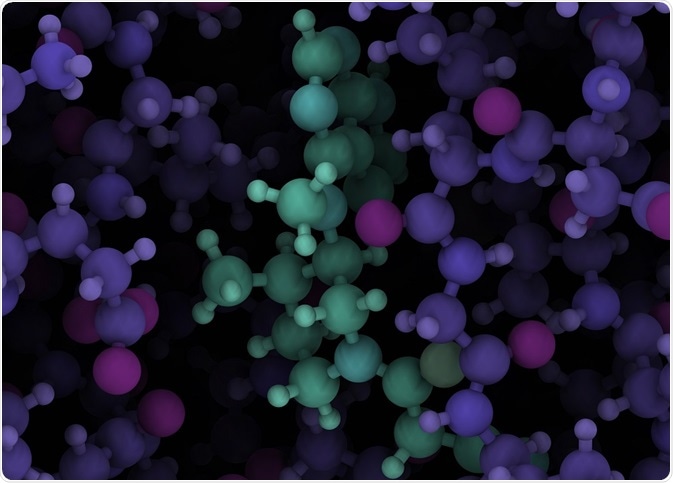The JAK/STAT (Janus Kinase-Signal Transducer and Activator of Transcription) signalling pathway controls the activity of various cytokines and growth factors.
 The Atomic Structure of Janus Kinase 1. Credit: molekuul_be/Shutterstock.com
The Atomic Structure of Janus Kinase 1. Credit: molekuul_be/Shutterstock.com
Hematopoiesis, adipogenesis, development of immune system and mammary gland and other processes involved in the sexual dimorphic growth are regulated by JAK activation through the stimulation of various events of cell growth and differentiation.
Mutations causing either the up-regulation or down-regulation of pathway activity would affect these developmental processes. In contrast, mutations that either trigger or cease to control JAK/STAT pathway control may result in the pathogenesis of leukemias, inflammatory diseases and gigantism.
Activation of the JAK/STAT pathway
Activation of JAK/STAT pathway occurs through binding of the different ligands to receptors which induces varied type of multimerizations of receptor subunits either as homodimers in case of growth harmones, erythropoietin or heteromultimers in case of interleukins and interferons.
The association of receptor subunits with JAK tyrosine kinases onto their cytoplasmic domains initiate the signalling cascade similar to the binding of cytokines to cell-surface receptor.
The phosphorylation of tyrosine residues on the receptor by the activated JAK provides the specific binding site for STATS, which are subsequently phosphorylated by JAKs leading to the formation of dimers which are translocated into the nucleus and stimulate gene transcription.
Mammalian JAKs are classified mainly into four variants: JAK1, JAK2, JAK3 and TYK2 (tyrosine kinase 2), whereas seven members constitute the mammalian STAT family: STAT1 to STAT4, STAT5A and B and STAT6.
Regulation of the JAK-STAT signalling pathway
The regulation of the JAK-STAT pathway is essential for cross interaction between various cytokine signalling pathways involved in the regulation of immune cell activity. The cross talk among the JAK-STAT pathway and with other pathways act as a feed-back loop in regulation of this pathway.
High expression of JAK3 by haematopoietic cells is essential for the signalling of various cytokines such as IL-4, IL-9, IL-2 and IL-15, while the deficient JAK3 expression leads to combined immunodeficiency of T cell-B cell+.
Optimal regulation of this vital signalling pathway depends on the combination of the type of STAT binding to the cell-surface receptor and the downstream effector proteins. Further studies are needed to uncover the role of various factors in regulation of JAK-STAT pathway.
Sources:
- Rawlings, J. S., Rosler, K. M., & Harrison, D. A. (2004). The JAK/STAT signaling pathway. Journal of cell science, 117(8), 1281-1283.
- Shuai, K., & Liu, B. (2003). Regulation of JAK–STAT signalling in the immune system. Nature Reviews Immunology, 3(11), 900.
- Darnell, J. E., Jr. STATs and gene regulation. Science 277, 1630–1635 (1997).
- Levy, D. E. & Darnell, J. E. Signalling: Stats: transcriptional control and biological impact. Nature Rev. Mol. Cell Biol. 3, 651–662 (2002).
- Stark, G. R., Kerr, I. M., Williams, B. R., Silverman, R. H. & Schreiber, R. D. How cells respond to interferons. Annu. Rev. Biochem. 67, 227–264 (1998).
- Leonard, W. J. & O’Shea, J. J. Jaks and STATs: biological implications. Annu. Rev. Immu. 16, 293–322 (1998).
- Notarangelo, L. D. et al. Mutations in severe combined immune deficiency (SCID) due to JAK3 deficiency. Hum. Mutat. 18, 255–263 (2001).
Further Reading
Last Updated: Aug 23, 2018